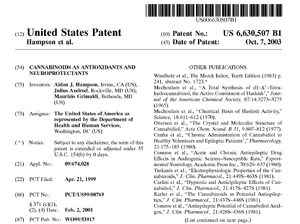Your Doctor Just Suggested Cannabis
Our engagement with cannabis is uniquely "medical." Cannabis contains dozens of medicinal components called cannabinoids, which are chemically similar to the endogenous cannabinoids or endocannabinoids our own bodies produce. Thus when we utilize cannabis - its active ingredients are modulating our own natural endocannaboid system (eCB). The discovery of this endogeous cannabinoid system has been what renewed the scientific and medical research in to cannabis and cannbinoids in the past two decades. The endocannabinoid system plays a critical role in coordinating the many balancing acts associated with life and does so from controlling biochemistry within cells to controlling social interactions and regulating political thought. Furethermore, the fact that noxious stimuli increases endocannabinoid release supports the notion that the eCB system is involved in pain modulation and management.
Be aware if you are utilzing medical cannabis that it is biphasic medication which is two separate and distinct responses that are separated in time and dose. What does this mean? small and large doses have an opposite response. Small doses of cannabis tend to stimulate; large doses of cannabis sedate. Too much THC, while not lethal, can amplify anxiety and mood disorders. CBD has no known adverse side effects at any dose, but CBD-drug interactions can be problematic. An excessive amount of CBD could be less effective therapeutically than a moderate dose. “Less is more” is often the case with respect to cannabis therapy.
Or Approach Your Doctor
Remember doctors are conservative by nature. The stigma of criminalization that has been associated with cannabis over the past half-century is one reason why your doctor may feel uncomfortable. Learn as much as you can before going in as you may also have to gently educate your doctor. Medical schools still lag in the teaching of the endocannabinoid system or eCB.
Why is the consumption of cannabis always "medical"?
Our engagement with cannabis is uniquely "medical." Cannabis contains dozens of medicinal components called cannabinoids (in addition to terpenes and flavonoids). Our own body also produces endogenous cannabinoids or endocannabinoids (eCB). Thus when we utilize cannabis - its active ingredients are interacting with and modulating our own natural endocannaboid system.
Why all the interest in medical cannabis? Why wasn't there always this interest?
The discovery of this endogeous cannabinoid system has been what renewed the scientific and medical research in to cannabis and cannbinoids in the past twenty years. The cannabis plant's THC and other cannabinoids mimics compounds found in the brain and elsewhere, named endocannabinoids which was discovered only in 1992 and 1995. This neurotransmitter system (eCB) went undetected for decades because it involves an unheard of concept, retrograde transmission, or reversed flow of information from the post synapse to the pre-synapse.
So where is the natural eCB (endocannbinoid) system?
We produced endocannabinoids in at least two general locations. CB1 receptors are abundant in the higher levels of the brain, the spinal neuron tissue, cortex, cerebellum but low in the brain stem. And there are CB2 receptors found predominantly in the lower intestine, in every major organ and actually throughout the body. In other words it turns out that the eCB system has more receptors that all the other receptors in the human body together.
So what does the eCB system do for us humans?
The CB1 receptors are involved in the regulation of various cerebral functioning including pain perception, mood, appetite and memory. The natural endocannabinoids production in the gut (CB2) assists in the regulation of the immune system and gut motility (pooping). Scientists have come to believe that the eCB system is THE regulator for the human body. There is literally not a body function that is not modulated by it. The eCB system represents the largest neurotransmitter system in the brain and immune system. Since the sum of an individual’s homeostatic activities is represented by one’s health. It is now known that the endocannabinoid system is an all-pervasive modulator of our biochemistry. Thus endocannabinoids regulate all body systems including cardiovascular, digestive, endocrine, excretory, immunological, nervous, musculo-skeletal, respiratory, reproductive, tegumentary (skin) where they often exert health-promoting properties.
What is endocannabinoid deficiency?
Since the eCB system has a normal state - doctors began to wonder what diseases we would get if we had a shortage of endocannabinoids produced. We now believe that multiple sclerosis, fibromyalgia, irritable bowel syndrome, lupus, Crohn’s may all be diseases relating to a shortage of natural endocannabinoids - now called endocannabinoid deficiency. This explains why cannabis assists patients with these conditions.
Thus Green Buddha has found that cannabis caps or maripills – extra virgin coconut oil with cannabis extract in a gel cap – can be extremely useful for those with autoimmune diseases and gut motility issues. This should come as no surprise for if as we now believe those conditions are caused by natural endocannabinoid shortage and we're feeding the CB2 receptor cannabinoids.
Where is medical cannabis research heading?
"The endocannabinoid system regulates many key physiological processes from feeding to memory formation, perhaps even extending to the biochemistry underlying individual personalities,” said Dr. Mechoulam. “I look forward to researching and developing products that support balanced endocannabinoid system function in both health and disease. Technical innovation by Phytecs in natural products chemistry, genomics and bioinformatics may create the next generation of cannabinoid medicines.” (Dr. Mechoulem is considered the world's greatest cannabinologist and the discoverer of THC.)
85 cannabinoids
Chemical similar compounds to the body's own endocannabinoid (eCB) system.
200+ terpenes
What gives cannabis those beautiful flavours and smells - also medicinal components.
23 flavonoids
Flavonoids are plant metabolites thought to provide health benefits through cell signalling pathways and antioxidant effects.
Dr. Mechoulam on Medical Cannabis
Dr. Carter on Medical Cannabis
- How much Cannabis to use?
- What medications decrease the effects of cannabis?
- What medications increase the effects of cannabis?
The average patients utilizes between approximately a gram to two grams a day. Dependency issues with cannabis are personality related and are not correlated to the potency of the cannabis used. Patients naturally select for potency.
Cannabis has biphasic properties, which means that low and high doses of the same substance can produce opposite effects. Small doses of cannabis tend to stimulate; large doses sedate. Too much THC, while not lethal, can amplify anxiety and mood disorders.
The following medications may enhance the effect of medicinal marijuana: Certain anti-depressants (e.g. fluoxetine, fluvoxamine, and nefazodone); Anti-acids (e.g. cimetidine and omeprazole); Antibiotics (e.g. clarithromycin and erythromycin)
Additionally Anti-fungals (e.g. itraconazole, fluconazole, ketoconazole, miconazole); Calcium channel blockers used for high blood pressure and heart disease (e.g. diltiazem, verapamil); HIV protease inhibitors (e.g. ritonavir, amiodarone, and isoniazid) also potentially decrease the effects of cannabis.
Rifampicin, Carbamazepine, Phenobarbital, Phenytoin, Primidone, Rifabutin, Troglitazone, Saint John's Wort...
Be aware Green Buddha is not a medical practioner and this information is merely meant as a guide. Please be sure to share with your physician that you are using medical cannabis and ask them specifically about any issues with other medications you are on.
Read the original medical cannabis science articles
Be empowered with the science of medical cannabis.
Cannabis and Specific Medical Conditions
Green Buddha is not a medical practitioner, so think critically and use everything you learn here as a guide for further research. We encourage you to have honest and frank discussions with your doctor.
Cancer Patient
Cannabis assists the oncology patient with the general pain issues, deter tumor creation and stimulate our auto-immune system.
Auto-Immune Patient
Now that we understand that your natural eCB system regulates your auto-immune system, we know better how to treat these conditions.
Sleep Disorder Patient
Consume a bit of a medible two hours before bed time and then a vape hit of Cannabis indica immediately before you intend to sleep.
MS & Neurological Patient
Cannabis assists MS patients with pain management - particularly for neuropathy pain, enhancing the eCB system and spasticity.
General Pain Patient
Medical cannabis was legal in this country everywhere up until 1937, and the major reason people used it? for pain management
Diabetes Patient
Study after study now affirms that cannabis users have a better ability - than the non cannabis using population - in resisting diabetes.
Psychological/PTSD/Depression
Washington State - convinced by the solid science - just added PTSD to the state's list of qualifying conditions.
Epilepsy & Seizure Disorder Patient
High CBD cannabis such as Charlotte's Web allowed the public to see how cannabis helps with seizures. Best results when mixed with THC.

